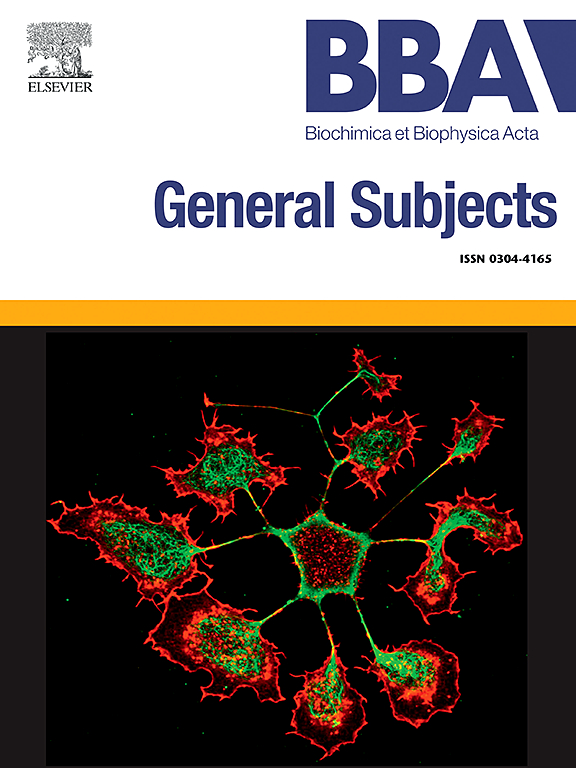Shaping resilience: The critical role of plant response regulators in salinity stress
IF 2.2
3区 生物学
Q3 BIOCHEMISTRY & MOLECULAR BIOLOGY
Biochimica et biophysica acta. General subjects
Pub Date : 2025-02-01
DOI:10.1016/j.bbagen.2024.130749
引用次数: 0
Abstract
Background
Salinity stress affects plant growth, development, biomass, yield, as well as their survival. A series of signaling cascade is activated to cope the deleterious effect of salinity stress. Cytokinins are known for their regulatory roles from cell growth and expansion to abiotic stress signaling. Two component system (TCS) are important multistep phosphorelay signal transduction machinery converging cytokinin, ethylene and light signal transduction pathways together. Plant TCS comprises of histidine kinases, phosho-transfer proteins and response regulators. Histidine kinases perceive the signal and relay it to response regulator via histidine containing phosphor-transfer proteins.
Scope of review
Response regulators are one of the major and diverse component of TCS system which have been extensively studied for their role in plant growth, development and circadian rhythm. However, knowledge of their regulatory role in abiotic stress signaling is limited. This mini-review specifically focus on role of response regulators in salinity stress signaling.
Major conclusion
Response regulators is the divergent node of TCS machinery, where cross-talks with other stress-mediated, phytohormone-mediated, as well as, light-mediated signaling pathways ensues. Studies from past few years have established central role of response regulators in salinity stress, however, the detailed mechanism of their actions need to be studied further.
General significance
Response regulators act as both negative as well as positive regulator of salinity and cytokinin signaling, making it an excellent target to increase crop yield as well as stress tolerance capabilities.
塑造恢复力:盐胁迫下植物反应调控因子的关键作用。
背景:盐胁迫影响植物的生长发育、生物量、产量和生存。一系列的信号级联被激活以应对盐度胁迫的有害影响。细胞分裂素因其从细胞生长和扩增到非生物应激信号的调节作用而闻名。双组分系统(Two component system, TCS)是将细胞分裂素、乙烯和光信号转导通路聚合在一起的重要的多步磷接力信号转导机制。植物TCS由组氨酸激酶、光传递蛋白和反应调节因子组成。组氨酸激酶感知信号并通过含磷转运蛋白的组氨酸将其传递给反应调节因子。反应调节因子是TCS系统的主要组成部分之一,其在植物生长发育和昼夜节律中的作用已被广泛研究。然而,对它们在非生物胁迫信号中的调节作用的了解是有限的。这篇综述特别关注了盐胁迫信号中反应调节因子的作用。主要结论:反应调节因子是TCS机制的发散节点,在此与其他应激介导、植物激素介导以及光介导的信号通路进行交叉对话。过去几年的研究已经确定了盐胁迫中反应调节因子的核心作用,但其作用的详细机制有待进一步研究。一般意义:响应调节因子是盐和细胞分裂素信号的负调控因子和正调控因子,是提高作物产量和抗逆性的优良靶点。
本文章由计算机程序翻译,如有差异,请以英文原文为准。
求助全文
约1分钟内获得全文
求助全文
来源期刊

Biochimica et biophysica acta. General subjects
生物-生化与分子生物学
CiteScore
6.40
自引率
0.00%
发文量
139
审稿时长
30 days
期刊介绍:
BBA General Subjects accepts for submission either original, hypothesis-driven studies or reviews covering subjects in biochemistry and biophysics that are considered to have general interest for a wide audience. Manuscripts with interdisciplinary approaches are especially encouraged.
 求助内容:
求助内容: 应助结果提醒方式:
应助结果提醒方式:


